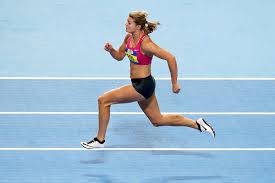The women’s 100 metres will be a more exciting race than the
men’s in Rio, simply because there are so many athletes who could potentially
win it.
The main contenders
are Tori Bowie, Dafne Schippers, English Gardner, Elaine Thompson and Shelly
Ann Fraser Pryce, with Tiana Bartoletta and Murielle Ahoure as outside bets.
Bowie was the bronze medalist at last year’s World
Championships in Beijing and opened up this year in great form. In the first
Diamond League meeting, Bowie clocked 10.80 to beat Dafne Schippers and did so
again, this time over 200 metres, in Eugene. Throughout the rounds at the US
Olympic Trials, Bowie was very impressive, and despite running a personal best
performance in the final, she finished third, which raises the question whether
she will be able to deliver her best performance in the final. Bowie will be
competing in both the 100 and 200 metres as well as the 4x100 metres relay, and
her coach, Lance Brauman’s thorough programme will provide her with the
strength to complete up to eight races.
 |
| Tori Bowie |
Schippers has continued her 2015 form into 2016 and has
looked very solid on the track this season, and has proven herself to be a
championship performer last year at the World Championships in Beijing where she
won a silver medal in each of the sprints. She has produced some amazing
performances on the Diamond League circuit this year, notably her 200 metres
run in Oslo. It is likely that whatever Schippers is physically capable of,
will be what she produces on Saturday night, in the 100 metres final. If she is
able to produce a start that leaves her in contention, then her textbook form
and minimal rearside mechanics will make her very dangerous over the latter
part of the race.
 |
| Dafne Schippers |
English Gardner is based in Los Angeles under the legendary
John Smith. A former Oregon Duck, she comes from a school currently known for
their female sprinters. Gardner has delivered impressive performances in
Diamond League races, but her strongest race was in the US Olympic Trials final
where she sped to 10.74 to put her second in the 2016 rankings. In what was
always going to be a close race, Gardner held it together mentally to run a PB
and defeat both Bowie and Tiana Bartoletta by four hundredths of a second. This
is a vital trait for doing well in the Olympic Final, where she, like all the
competitors, will be under immense pressure.
 |
| English Gardner |
Elaine Thompson made substantial improvements last year
under coach Stephen Francis. She ran Schippers extremely close in the World
Championship final over 200 metres in Beijing, running 21.65. This year though,
her most impressive performance has been over the 100 metres, winning the
Jamaican Olympic Trials in 10.70 seconds, making her the fastest woman in the
world in 2016. A surprisingly poor run in Oslo over 200 metres perhaps raised a
couple of questions, where she was well beaten by Schippers, but Thompson has
only qualified for the 100 metres in Rio, having not run the 200 metres final
at her Olympic Trials.
 |
| Elaine Thompson |
Shelly Ann Fraser-Pryce has perhaps had her achievements overshadowed
by Usain Bolt. She has won the last two Olympic 100 metres titles and three of
the last four World Championship 100 metres titles. Last year in the World
Championships 100 metres final, Fraser-Pryce did enough in the first part of
the race to prevent Schippers from catching her with her strong finish, and
questionable early season form suggests that her starts will need to be on
point if she is to win her third Olympic 100 metres title. Another of Stephen
Francis’ athletes, Fraser-Pryce cannot be ruled out however, even though there
are seven women faster than her over 100 metres this year.
 |
| Shelly Ann Fraser-Pryce |
Tiana Bartoletta, last year’s long jump World Champion,
finished second at the US Olympic Trials in 10.78 to secure her spot on the
team, but was well beaten a couple of weeks later in Monaco by Schippers.
Murielle Ahoure ran 10.78 in early June at a small meeting in Florida. Both
women haven’t produced a performance to back up these runs as yet, and it is
often difficult to reproduce an anomaly in an Olympic Final. However, stranger
things have happened, and as they always say, once an athlete makes the final,
anything can happen!

No comments:
Post a Comment